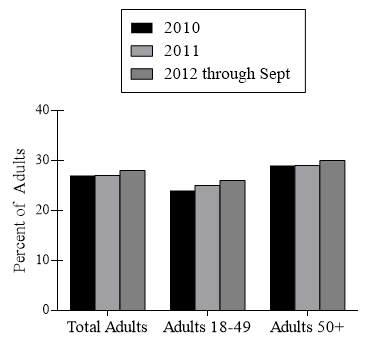P811
With the rapid expansion of scientific knowledge of the human body and of medical interventions, more and more of human experience is becoming understood through the lens of medical science. What elements constitute legitimate medical problems as well as the nature of these problems are frequently contested topics, and lay actors participate in this contestation. Individuals without formal medical training now regularly educate themselves about emerging medical diagnoses and treatments and, individually and collectively, advocate for recognition, research, and treatment of particular medical conditions. Attention-deficit/hyperactivity disorder (ADHD) is one of many diagnoses that have expanded with the joint support of medical professionals and lay actors.

Figure 1. Percent of US adults claiming to cut down on or avoid gluten completely.
The figure above presents yearly summaries of data from bi-weekly surveys conducted by a consumer research firm using large, representative national samples. As part of the survey, participants were asked whether they were trying to cut down or avoid consumption of gluten. While there is little controversy that individuals with celiac disease suffer when they consume gluten, this condition only affects roughly one percent of the population. Claims that there is a much larger population of individuals with non-celiac gluten sensitivity (NCGS) – leading to problems as diverse as headaches, depression, and fatigue – or of broad health impacts of gluten consumption are more contested.
.
Find an error? Take a screenshot, email it to us at error@mytestingsolution.com, and we’ll send you $3!
